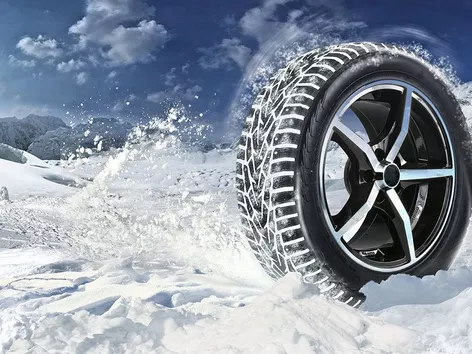Winter tyres in Europe: in which countries are they compulsory and when do you need to change them?

In many European countries, it is compulsory to change winter tyres before the start of the snow and ice season. In addition, there are several different winter tyre labelling options, which may vary from country to country. Find out when to change your tyres and what administrative penalties are available for non-compliance in different European countries
Use of winter tyres in European countries
Moldova
From 1 December to 1 March, winter tyres in Moldova are mandatory for cars weighing up to 3.5 tonnes and trailers if there is a solid layer of snow or ice on the road. There is no exact date for the transition to winter tyres in Moldova, as it depends on the weather conditions. However, traffic rules require that this transition be made annually from 1 November to 1 December.
Chains are allowed on roads covered with snow and ice. Studded tyres are also permitted only if there is snow or ice on the roadway, ice, or when there is a significant difference in meteorological conditions throughout the Republic of Moldova.
The legislation does not prescribe requirements for the type of tyre; traditional tyres are S+M with a tread depth of more than 3 mm (lesser depths are ineffective).
Romania
Since 2011, Romania has banned driving a car without winter tyres between 1 November and 31 March. It should be borne in mind that special attention is paid to this in the event of appropriate weather conditions (slush, snow, ice on the road).
Chains are recommended for use when travelling in the mountains.
Tyres must be labelled M+S or M&S on all vehicles over 3.5 tonnes.
Slovakia
From 15 November to 31 March, under appropriate weather conditions (solid layer of snow or ice on the road), vehicles with a total weight of up to 3.5 tonnes must be equipped with winter tyres. For vehicles with a total weight of more than 3.5 tonnes, winter tyres are mandatory throughout the entire period. The drive axle must be fitted with winter tyres.
Chains may only be used if the snow layer is sufficient to prevent damage to the road surface.
Tyres must be labelled M+S or M&S, with a minimum tread depth of 3 mm.
Hungary
Winter tyres are required for drivers in Hungary from 1 November to 31 March, but they are not mandatory. Chains, on the other hand, may be mandatory, but under certain weather conditions. If the road sign ‘Chains are required’ is installed at the border, then the car can cross the border only if it has chains.
Poland
Germany
In Germany, there is no clearly defined date for the transition, but experts advise changing tyres in October and ‘wearing’ them until Easter.
The tyre labelling in Germany is special: on ice, snow, sleet and snow with ice, motorists must drive on tyres marked with the M+S symbol or the mountain symbol with a snowflake.
Snow chains are permitted if they are marked with the appropriate road sign.
Czech Republic
From 1 November to 31 March, under appropriate weather conditions (solid layer of snow or ice on the road), vehicles with a total weight of up to 3.5 tonnes must be equipped with winter tyres. It is recommended to use winter tyres when the air temperature drops below 4°C. Failure to use winter tyres will result in a fine of CZK 1,500 to 2,500.
According to the regulation of the Ministry of Transport, winter tyres are those labelled M+S, M.S, M/S or MS and tyres with ET, ML, MPT markings.
Snow chains may be used if there is a corresponding road sign. The maximum speed is 50 km/h.
Spain
Winter tyres are not required in Spain, but are recommended in the winter weather conditions in the north of the country. Studded tyres are allowed from 15 November to 31 March on roads covered with snow or ice.
Austria
Between 1 November and 15 April, under appropriate weather conditions (snow, ice on the road), vehicles with a gross vehicle weight of up to 3.5 tonnes must be fitted with winter tyres. For vehicles with a gross vehicle weight of more than 3.5 tonnes, winter tyres are required during this period of time. If a vehicle is not equipped with winter tyres, the offender will face a fine of €50, but if a car without winter tyres causes an accident without injuries, the fine will be €5,000.
Studded tyres are only allowed to be used on vehicles weighing no more than 3.5 tonnes from 1 October to 31 May. Local authorities may extend this period. Studded tyres must be fitted to all wheels. The speed of vehicles equipped with studded tyres must not exceed 100 km/h on motorways and 80 km/h on other roads.
Snow chains may be used in conjunction with summer tyres. They must be fitted to at least 2 drive wheels. Snow chains are only permitted if the road is completely covered with snow or ice.
Netherlands
France
Winter tyres are not compulsory in France. They are required in mountainous areas for a short period of time. Roads in these regions are signposted accordingly.
Studded tyres are permitted from the last Saturday before 11 November to the last Sunday in March. Depending on weather conditions, this period may be extended. When driving on studded tyres, vehicles registered in France are required to display a 90 km/h speed limit sticker. For vehicles registered in foreign countries, it is advisory.
Snow chains may be required on mountain passes.
What are the requirements for winter tyres in Ukraine?
The use of winter tyres in Ukraine is not regulated by law, so you will not receive a fine for changing the tyre cover in time. However, experts recommend switching to winter tyres for road safety.
Permitted tread height: 1.6 mm for cars up to 3.5 tonnes, 1 mm for cars over 3.5 tonnes, 2 mm for buses, 0.8 mm for motorbikes.
The M+S marking is traditional in Ukraine.
To travel abroad by your own car, purchase a Green Card insurance policy. It is mandatory and guarantees your safety on European roads. To apply for it, please contact Visit Ukraine specialists.
Want to know more? Read the latest news and useful materials about Ukraine and the world in the News section.
Our recommendation for a safe and comfortable trip:
Visit Ukraine Insurance - insurance for a safe stay abroad without unnecessary expenses;
Green Card - compulsory car insurance for traveling abroad;
Visit Ukraine Tickets - book tickets for buses, trains, and airplanes to/from Ukraine and between cities around the world;
Private Lawyer service - professional legal support on visa and migration issues;
Visit Ukraine Merch - buy patriotic clothing and accessories with worldwide delivery.
© 2018-2024, Visit Ukraine. Use, copying or reprinting of materials on this site is permitted only with a link (hyperlink for online publications) to Visit Ukraine.
All rights reserved.
Recommended articles
2 min
Work
August 2024 showed a record number of vacancies in the Ukrainian labor market and an increase in salaries. Find out which categories of professions are in the greatest demand, where there is the largest increase in vacancies, and what salaries employers offer
15 Sep. 2024
More details2 min
BusinessUA
The grant programme for own business has been expanded: who can now get money for business
Now one more category of Ukrainians will be able to get a grant to start their own business. Find out who and how can open their own business, and how much the state allocates for it
15 Sep. 2024
More details3 min
Finance
Which EU countries have the cheapest mortgages or where it is profitable to buy a home on credit?
For many people, mortgages and long-term loans are the only way to get their own home. It is important to keep in mind that the interest on such a loan is stable over time. Find out which European countries have the cheapest and most expensive mortgages
18 Sep. 2024
More details1 min
Finance
Ukraine seeks to reduce the gap between men's and women's salaries: what steps are to be taken
Ukraine wants to improve gender pay equality. To this end, the country has launched an information campaign. However, these are not the only plans to improve the situation with the gap between men's and women's salaries
18 Sep. 2024
More details

